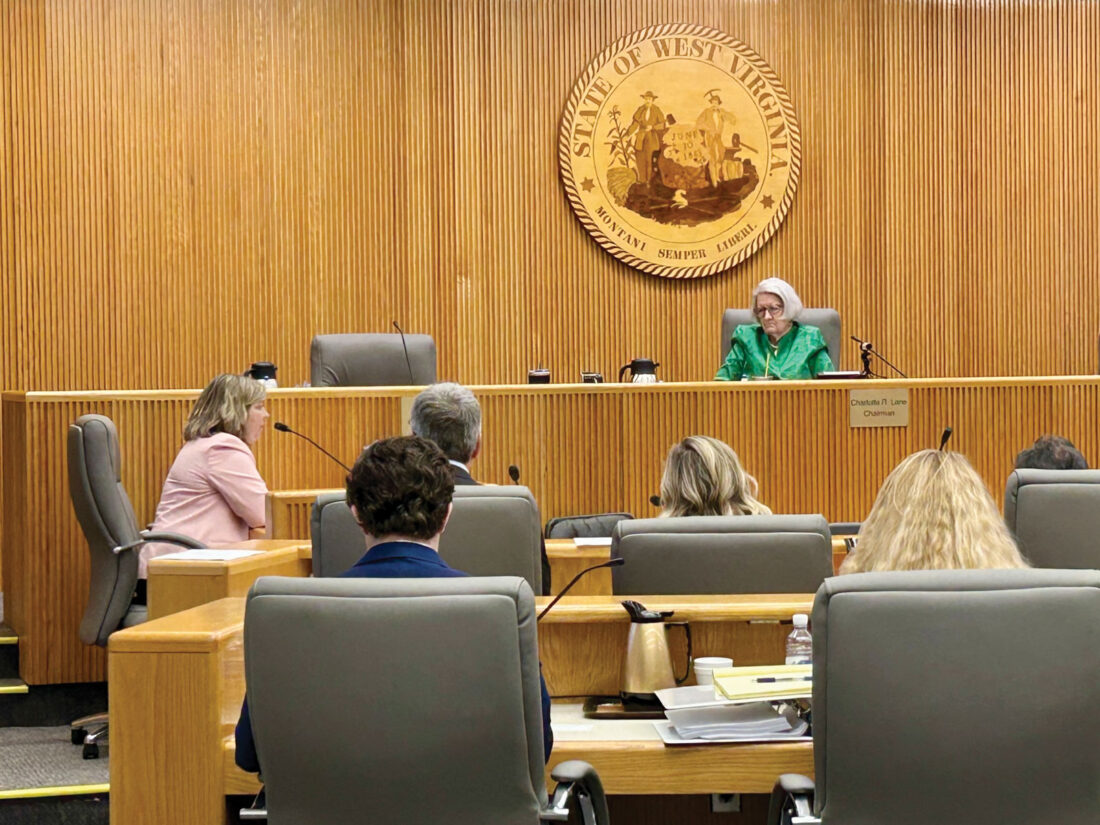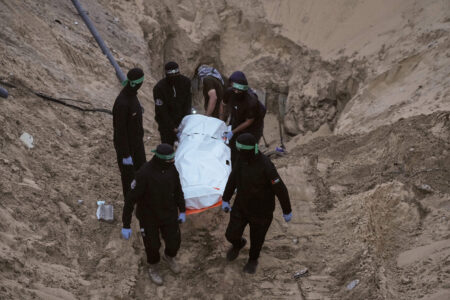PSC hears evidence in case involving broadband pole attachments

Photo by Steven Allen Adams West Virginia Public Service Commission Chairwoman Charlotte Lane listens as Ronay Tenney, left, the director of engineering services for FirstEnergy, provides testimony Tuesday during an evidentiary hearing at the PSC headquarters in Charleston. (Photo by Steven Allen Adams)
CHARLESTON — West Virginia Public Service Chairwoman Charlotte Lane had blunt words for electric utilities, internet services providers, and state broadband officials Tuesday during the start of a hearing that will determine rules for expanding fiber broadband on existing power poles. “The West Virginia Public Service Commission is not going to be the reason that we don’t get broadband to this state,” Lane said Tuesday morning at the beginning of the day’s proceedings at the PSC headquarters in downtown Charleston. “I am just sort of appalled that we are here today still fighting over this issue,” Lane continued. “I hold the parties in this room responsible for the most part for where we are today, and we need to get something done.” The PSC set Tuesday for an evidentiary hearing in a case stemming from an Aug. 23, 2024, order issued by the PSC to create a task force to help the commission develop rules regarding pole attachments — the placement of fiber broadband cables and other equipment on electric poles owned by subsidiaries of Columbus-based American Electric Power and Akron-based FirstEnergy. That task force – consisting of representatives for Appalachian Power and Wheeling Power, MonPower and Potomac Edison, several internet service providers (ISPs) and trade organizations, telecommunications representatives, and state officials, issued a final report at the end of January. Recommendations from the task force included implementing a rapid response team for dispute resolution between pole owners and ISPs, sharing pole inspection reports, establishing an annual reporting requirement for pole owners, and creating a joint list of approved outside contractors for pole work. However, the report also highlighted that not all recommendations achieved unanimous consensus among participants. On Feb. 25, the PSC adopted several of the pole attachment task force’s recommendations, including creation of the rapid response team for accelerated informal dispute resolution, implementation of the current Federal Communication Commission regulations regarding the sharing of poll inspection reports, and adoption of the joint list of approved contractors approved or provided by the primary pole owners. The PSC also required pole owners to update the list quarterly. Due to the lack of consensus on other topics, including a proposal to create a pole information database supported by the West Virginia Office of Broadband and Broadband Enhancement Council, the PSC ordered Tuesday’s evidentiary hearing. Ronay Tenney, the director of engineering services for FirstEnergy and its subsidiaries (MonPower and Potomac Edison), was grilled Tuesday morning by Peter Markham, an attorney with Bowles Rice representing the West Virginia Broadband Enhancement Council, regarding FirstEnergy’s opposition to collecting or providing certain data on poles unrelated to their own electrical services. “The data that we currently collect is directly related to providing electric service to our customers,” Tenney said. “That’s the type of data we collect, and that’s a type of data that we report on and maintain. So, the data that has to do with items that is not directly related to serving our electric customers is what would be difficult for us to either collect and some of what we don’t record currently…That is a lot of labor and a lot of money for what we do not feel is of any value.” FirstEnergy conducts pole inspections for its more than 600,000 utility poles every 12 years in batches, while AEP does its pole inspections every 10 years. The Office of Broadband and the Broadband Enhancement Council support the creation of a centralized Utility Pole Attachment Database, which would include 10 key data points, such as pole ownership, the age of poles, pole height, the class of pole, and attachments on the pole. While both AEP and FirstEnergy collect some of this information, they argue that collecting all of it would be time consuming and costly, though the Office of Broadband has offered to secure federal funding to subsidize a percentage of the potential cost of a database. “We can do a lot of things. It doesn’t mean we should do a lot of things,” Tenney said. “We never said it was impossible to collect it. Our position is that it is not worth it…because they do not serve our electric customers any purpose.” “So, broadband is not a priority,” asked Markham. “Wow, you’ve really twisted that around, haven’t you? Broadband is absolutely a priority, and for anyone to think that FirstEnergy doesn’t feel that way is wrong,” Tenney said. “We want broadband just as much as everybody else. We’re using it for our own communications. The fact is, though, that we don’t feel collecting the height of the broadband cable on our pole 12 years ago, or taking 12 years to get it, is going to be of any value to expanding broadband in West Virginia.” FirstEnergy also believes continuation of the pole attachment task force should not happen, or the task force should only focus on removing state and federal hindrances to broadband expansion. Tenney said FirstEnergy would rather work with ISPs wishing to attach fiber to their poles on a one-by-one basis. “We really feel that the best way to get this done is to have us work directly with the attaching companies. That is the fastest way to get the work done,” Tenney said. “Isn’t it possible to do both? Continue the working group as well as the companies have direct discussions with the attachers,” Markham asked. “It would be if the working group is very well-defined and does not focus on or even discuss everyday issues that are between the poll owner and the attaching company,” Tenney said. FirstEnergy works with its utility linemen or third-party contractors to install fiber broadband to FirstEnergy-owned poles. The company will not allow ISPs to hire their own contractors and insists on overseeing all pole work. FirstEnergy claims it is not profiting off of pole attachment proposals and only charging for the costs for making the poles ready for broadband attachments. “It’s not as simple as just putting a wire on a pole for the power space. It is more complex,” Tenney said. “When you add up what we do now without the overheads, we’re spending more than we’re taking in.” Rebecca Pomeroy, an attorney with Bailey and Glasser representing Bridgeport-based ISP Citynet, presented evidence Tuesday that FirstEnergy showed two different costs charged for Citynet projects for similar poles in Gilmer County and Wood County. “Would you agree with me…that differences in the costs for both of these projects appear to call into question as to why a project in Gilmer County would cost $5,412 versus a project in Wood County for the same type of poll would cost almost twice as much,” Pomeroy asked. “I wouldn’t make a county connection,” Tenney said. “If I was sitting there, I would have asked the question. I think it brings to curiosity for what is the difference in the cost of the pole. But I wouldn’t tie it to the county. But I understand why you did. I understand how you came to that conclusion.” Following the conclusion of the evidentiary hearings, which could continue into Wednesday, Lane said the PSC would act quickly on issuing an order on pole attachment rules. “At the end of the day, after you all have made all of your presentations, the commission will enter an order pretty quickly because West Virginians are waiting for broadband and the people in this room can make it happen or you can be part of the problem and the commission is going to make sure that you all are not the problem,” Lane said.





